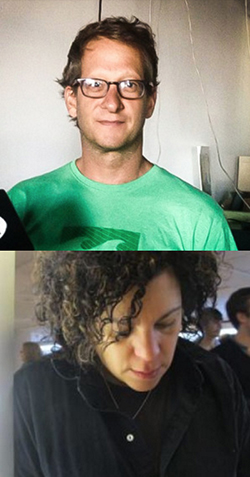 Remember the old saying, you cannot truly judge a person until you’ve walked a mile in their shoes? VR changes that from a folksy metaphor into something you can experience first-hand. Specular Theory founder Morris May and filmmaker Rose Troche used this concept to tackle a controversial subject in their VR film Perspective Ch. 2: The Misdemeanor. The project is one of the many VR/AR experiences on display at the Sundance Film Festival in Utah.
Remember the old saying, you cannot truly judge a person until you’ve walked a mile in their shoes? VR changes that from a folksy metaphor into something you can experience first-hand. Specular Theory founder Morris May and filmmaker Rose Troche used this concept to tackle a controversial subject in their VR film Perspective Ch. 2: The Misdemeanor. The project is one of the many VR/AR experiences on display at the Sundance Film Festival in Utah.
Here’s a description of the project:
Perspective: Chapter 2 is an immersive experience that transports the viewer to the streets of New York and puts them in the middle of an urban petty theft that escalates quickly and leads to serious ramifications. Filmed as first-person POV, the film offers four different perspectives on the event – that of the teens accused of stealing and that of each police officer involved in apprehending them. This emotionally gripping VR experience offers an unprecedented look at the very inside of the timely topic of police brutality, one of the most important topics facing US society today.
The film places you in the role of a young black male named Sean who, along with his brother, is being questioned and eventually harassed by a police officer. Sean’s brother becomes your brother in the experience. The exchange ultimately has disastrous consequences that I won’t spoil. The project includes fully immersive 360-degree video, spatial audio and even takes care to place the camera at Sean’s height rather than your own for the entire experience. I had the chance to talk with Troche and May about the creative, technical and social ramifications of the Perspective series.
May was able to get a foot in the door at Sundance with a basic idea due to the festival’s eager attitude toward VR.
“The series started last year. I pitched the idea of a VR experience like this to Sundance…I knew they were looking to incorporate more VR into the show and they really liked the idea…They eventually connected me with Rose who came up with the idea for the original script,” May said.
Chapter 1 employed the same point-of-view switching mechanic as The Misdemeanor by creating a VR experience in which you assume the character of a girl who becomes the victim of date rape. May and Troche seem determined to tackle some of the most controversial topics. May sees this commitment as a way to help solve these problems and not merely a bid to stir up publicity.
“We want to take on hot-button issues,” May said. “These are important things and we think they are important ideas…Imagine you have the power to change people’s perspective. Imagine you can actually show someone what it’s like to be a police officer or a black teenager.”
The script of the film came from Troche’s experiences working as a teacher in a primarily Latino school in Chicago. According to Troche:
[I] saw first-hand what these kids had to go through on the daily – the mistrust, the guilty until proven innocent, the intense bias that it fostered between those young people of color and law enforcement…The Misdemeanor is meant to push that conversation. By experiencing the fear and bias from all sides it can potentially shine a light on this deeply polarizing issue.
Producing these films in VR makes them narratively compelling, but it also led to technical challenges that needed to be overcome. May said Specular Theory usually creates their own proprietary cameras and tech in order to meet the needs of each individual shoot.
“This shoot had to have stereoscopic imaging that was supposed to represent someone else’s eyeballs,” May said. “In order to capture this we built our own camera rig that basically ended up looking like a backpack. Then we had to take it through a post-production pipeline process in order to keep our viewers from feeling cross-eyed or misplaced during the experience.”
The difficulties of VR filming became apparent to Troche as well during production:
In VR you do not have this control of the viewer’s gaze, they are free to look at the space and become distracted so it is important to think of the space as a whole – the narrative of the 360 space. Once you accept that, you are part way there. It’s a matter of retraining your brain.”
Despite its challenges, May believes VR filmmaking will eventually overtake traditional cinema in popularity:
VR cinema is gonna dominate and become the primary source of entertainment. The rest will fade away. Right now, even the high budget stuff can be gimmicky but real storytellers are starting to take hold of this and they are going to be able to seriously play with your emotions.
Specular Theory is currently working on a free app for their experiences that would initially be released on the Gear VR. A beta version of the app will be used to display The Misdemeanor at Sundance. The company is also planning to launch a series called Behind the Scenes in the next six months on YouTube that will take viewers inside the process of creating VR films.






























